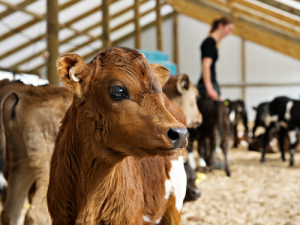DairyNZ opens applications for associate director role
DairyNZ is giving New Zealand farmers a unique opportunity to gain hands-on governance and leadership experience within the dairy sector.
 Cruel and illegal practices are not in any way condoned or accepted by the industry as part of dairy farming.
Cruel and illegal practices are not in any way condoned or accepted by the industry as part of dairy farming.
DairyNZ chief executive Tim Mackle says cruel and illegal practices are not in any way condoned or accepted by the industry as part of dairy farming.
“The vast majority of farmers care about their animals and we are committed to farming to very high standards,” says Mackle.
“DairyNZ works closely with the wider industry in the management of bobby calves, including the transport sector, meat processors and dairy companies, as well as Federated Farmers and MPI.”
Tim says the video released yesterdat by Farmwatch shows some footage of transport companies and their workers, as well as some unacceptable behaviour by farmers of dragging calves.
“Last year we saw footage of abhorrent treatment and cruelty of calves at a pet food processing plant. Today’s footage of calves being passed and loaded on to trucks is nothing like that footage, and cannot and should not be compared.
“While some of the handling is rougher than we would like, the workers appear to be following the accepted practice of loading calves by rolling them rear end first. Despite perception, this is the best way to prevent calves from stepping back out of the truck and causing themselves harm.”
Mackle added that the new regulations coming into effect in August 2017 addressed this by requiring farmers to have loading platforms and therefore reducing the requirement to lift.
“Many farmers have already taken steps to put loading facilities in place well ahead of the regulations.”
He says that while formal figures are not yet available there was anecdotal evidence of significant improvement over the past season with the numbers of calves that are picked up being fit for transport.
Tim also acknowledges the significant amount of work the sector, and especially the farmers themselves, have done to ensure improvements.
DairyNZ as part of the wider group has focussed on supporting farmers by:
Bobby calf focus events and training, attended by over 2300 farmersUpdated resources and posters for ensuring calves were fit for transport and loading facility designNew bobby calf handling resources.
“While there is still work to do with a minority of farmers, it is important to remember that the vast majority of our dairy farmers are treating their animals with care and respect.”
The World Wide Sires National All Day Breeds Best Youth Camp Best All Rounder plaudit has become family affair, with 2026 Paramount Cup winner Holly Williams following in her sister Zara's footsteps.
DairyNZ is giving New Zealand farmers a unique opportunity to gain hands-on governance and leadership experience within the dairy sector.
Herd improvement company LIC has posted a 5.2% lift in half-year revenue, thanks to increasing demand for genetics.
According to the latest Fresh Produce Trend Report from United Fresh, 2026 will be a year where fruit and vegetables are shaped by cost pressures, rapid digital adoption, and a renewed focus on wellbeing at home.
The Roar is a highlight of the game hunting calendar in New Zealand, with thousands of hunters set to head for the hills to hunt male stags during March and April.
OPINION: The past few weeks have been tough on farms across the North Island: floods and storms have caused damage and disruption to families and businesses.
OPINION: Fonterra may be on the verge of selling its consumer business in New Zealand, but the co-operative is not…
OPINION: What does the birth rate in China have to do with stock trading? Just ask a2 Milk Company.